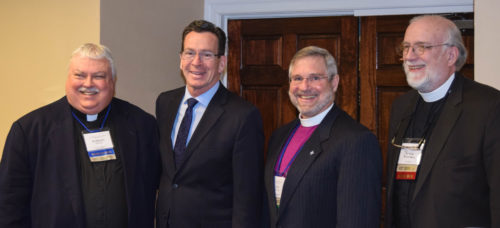Episcopal Urban Caucus witnesses against gun violence in AmericaPosted Mar 5, 2015 |
|

Episcopal Urban Caucus President the Rev. Robert Brooks, Connecticut Gov. Dannel Malloy, Connecticut Bishop Ian Douglas and the Rev. Peter Bushnell, who chairs the Connecticut diocese’s Social Justice and Advocacy Committee, gather during the caucus’ recent assembly in Meriden. Photo: John Armstrong
[Episcopal News Service] Members of the Episcopal Urban Caucus gathered in Meriden, Connecticut, for their annual assembly to consider how people of faith can challenge violence in America.
The Feb. 25-28 event, with a particular focus on gun violence, featured an informal conversation with Connecticut Gov. Dannel Malloy. Other activities included visits to two locations where work is underway to reduce violence and 10 workshops that offered stories and described programs to promote reconciliation and peace.
Founded in 1980, the Episcopal Urban Caucus is an association of lay and ordained Episcopalians dedicated to the cause of reconciliation, social justice and peace. The Rev. Canon Robert J. Brooks, who is also vice president of the Associated Parishes for Liturgy and Mission, is the caucus’ president. The caucus gathers every year in February at a different location with cooperation from the local diocese.
This year the group chose to come to Connecticut because of the commitment of the Episcopal Church in Connecticut to work against gun violence in the wake of the tragedy at Sandy Hook Elementary School. The diocese’s Social Justice and Advocacy Committee, led by the Rev. Peter Bushnell of Enfield, offered to help host and organize the event.
Malloy opened the assembly, noting that income inequality and climate change are the two biggest issues facing the United States. As other speakers and participants did throughout the three-day event, he also identified jobs as key to reducing violence. He cited steps he has initiated to keep young people from going to jail and getting a criminal record. Malloy recently signed legislation decriminalizing the possession of marijuana, and said that the change led to 6,000 fewer arrests last year. The governor also talked about the importance of raising the minimum wage and concluded his talk with the observation that “no person working 35 to 40 hours a week should live in poverty.”
During the assembly, participants visited Enfield or Hartford. Enfield’s Educational Resources for Children, an organization that provides innovative after-school programs, was highlighted for its focus on conflict resolution and anti-bullying.
The Hartford group visited the downtown Christ Church Cathedral for a panel discussion on challenging gun violence in the city. The panel was organized by the Rt. Rev. James Curry, recently retired Connecticut bishop suffragan. Panelists included the Rev. Henry Brown, founder of Mothers United Against Violence; the Rev. Stephen Camp, senior pastor of Faith Congregational Church; Bishop John Selders, pastor of Amistad United Church of Christ and assistant chaplain at Trinity College in Hartford; and the Rev. Harlon Dalton, priest-in-charge at the cathedral. The panelists discussed the importance and challenges of raising awareness of social injustice in their congregations, citing stories where the wider community celebrated their work but a few individual parishioners were strongly opposed.
Among the workshops was one with Canon David W. Porter, director of reconciliation for the Archbishop of Canterbury and formerly a peace-building practitioner in Northern Ireland. Porter discussed how he was helping the archbishop pursue his commitment to reconciliation and getting people to “disagree well.” Emphasizing that his focus is on building relationships and offering advice on the best processes to achieve reconciliation, Porter outlined a variety of lessons he had learned over the years, concluding that “reconciliation is always a quest.”
Connecticut Bishop Ian Douglas and Connecticut Bishop Suffragan Laura Ahrens later described the goals of Bishops United Against Gun Violence, a network of Episcopal bishops that encourages and promotes direct action to overcome gun violence through advocacy, community organizing, education, the creation of resources, and collaboration with other groups beyond The Episcopal Church. Douglas and Ahrens outlined the emergence of the network, described some of its initiatives, and invited lay and ordained leaders in The Episcopal Church to imagine how they too might organize for effective action against gun violence.
In another workshop, titled “Community Coping Strategies in Response to Tragedy in Newtown,” the Rev. Kathie Adams-Shepherd, rector of Trinity Episcopal Church in Newtown, discussed how various community organizations and programs have developed since the December 2012 tragedy to assist in healing and also to challenge the pandemic of gun violence in the United States.
The Rev. Molly James, priest associate at the Hartford Cathedral; Diane Pollard, caucus treasurer; and Nell Gibson, caucus board member, discussed in another workshop the resolutions to be offered at the upcoming General Convention that focus on ways Episcopalians can respond to the church’s witness against gun violence.
In addition, Jennifer H. Huebner, the Connecticut coordinator for PeaceJam New England, described how the PeaceJam Foundation mentors young adults hoping to inspire leaders of the next generation. At PeaceJam conferences, Nobel Peace laureates spend two days sharing their experience, skills and stories with youth and offering them inspiration.
The evening concluded with a showing of the film Children of the Light, which tells the story of the life of Archbishop Emeritus of Cape Town Desmond Tutu.
“I am so thankful that the Episcopal Urban Caucus chose to come to Connecticut,” Douglas said. “The presence of sisters and brothers in Christ from around The Episcopal Church helped us to continue the healing process after the tragedy in Newtown and reminded us that we are not alone in challenging gun violence as participants in God’s mission.”
Next year’s assembly will take place in Delaware under the leadership of the Rev. David T. Andrews, rector of the Episcopal Church of Saints Andrew and Matthew in Wilmington.
̶ John Armstrong is a retired IT professional now working as a freelance journalist.

Social Menu